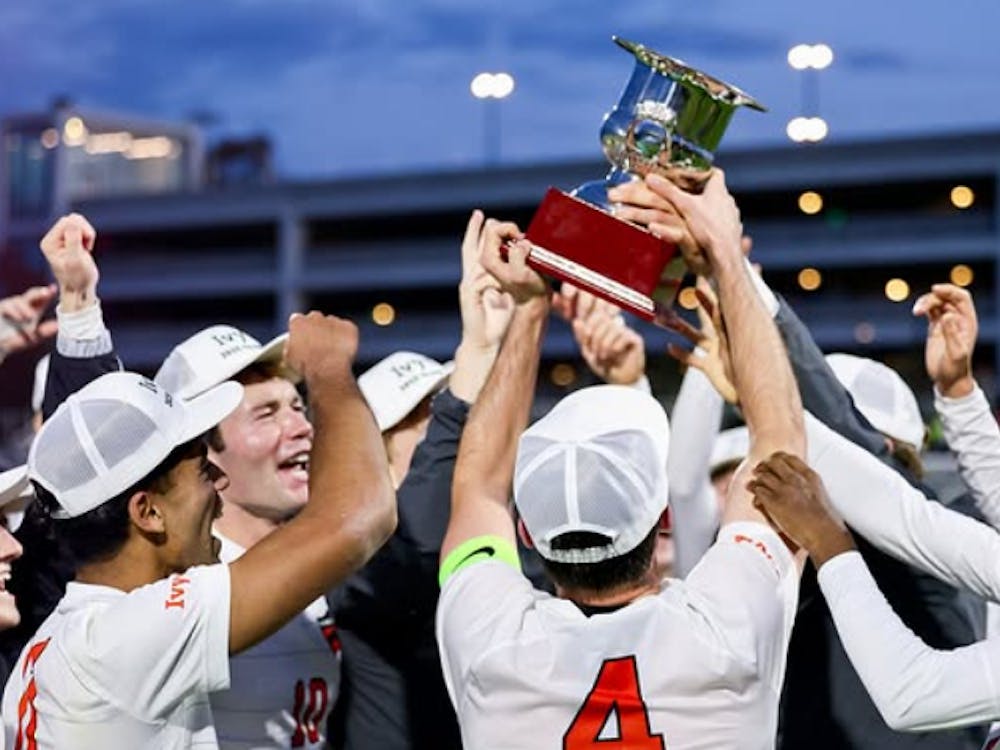Under former head coach Glenn Michibata’s 12-year tenure, the men’s tennis team never won the Ivy League championship. The team came close — in 2011, the Tigers went 6-0 in the Ivy League before losing to Cornell by one tight match in the deciding meeting — but still has not won the title in the 21st century.
When Billy Pate took over as head coach last May, he said in a press conference that under him the team would “work tirelessly” to finally win back the title. But that is no longer his goal. In fact, he speaks of the Ivy League championship as somewhat of a distraction to what he thinks Princeton men’s tennis should be striving to achieve: a return to national prominence.
“It’s sort of been hammered into them that the Ivy’s the thing, and it is, and we’ll discuss that, but we also have to focus on the process of getting better,” Pate said. “Sometimes we can be shortsighted and just focus on winning the Ivies. I think we need to look beyond that.”
If the Tigers can make their way into the top 20, Pate thinks, the league title will take care of itself. Title-hungry players have already bought into the attitude. After all, Harvard finished last season ranked No. 24, and Pate said the Tigers feel they are the better team.
“It’s a good approach for the program on the long-term scale,” senior Matija Pecotic said. “It might not happen immediately — I’m hoping it happens this year while I’m still here — but he thinks this program could be, in a couple of years, a top-20 or top-30 program. In his mind, the Ivy League title will take care of itself. We’ll win our conference, and then Princeton tennis will be relevant on the national scale.”
It’s a bold expectation considering the Tigers were ranked at just No. 63 in the 2010-11 season, their best in recent history. But coming from someone who has spent the past 10 years coaching and observing players in the Southeastern Conference — a tennis powerhouse during the past few decades — that hope sounds a bit more believable.
Pate grew up in Arkansas and went to high school in Mississippi. A communications major at Mississippi State, he played tennis while working as a stringer for regional newspapers covering the baseball team. He graduated in 1992, just as sports administration master’s programs were expanding at universities across the country. Pate never thought he’d get into coaching, but he thought he might want to work as an athletic director at a university and decided to attend graduate school at Georgia State in Atlanta.
After graduating, Pate took a job as a sports information director at Georgia Perimeter College, a junior college with a small athletics program. The coach of the tennis team at the time was “more of a general coach,” according to Pate, and asked him to help out with the team. Pate got the head coaching job shortly thereafter and led Georgia Perimeter to three consecutive national titles.
At that point, Pate had “caught the bug,” he said. He spent two years as an assistant coach at Notre Dame before taking the head position at Alabama. During his 10 years there, the Crimson Tide made seven NCAA tournament appearances and held its own against SEC powerhouses Georgia and Florida.
Despite his success, Pate had long held the Ivy League — and Princeton in particular — in high regard for its prioritization of academics.
“I love college athletics. I love the SEC. I love being in that environment, but somehow we probably lost our way in terms of the importance,” Pate said. “Athletics are here because of the university; the university is not here because of athletics, and I think sometimes we forget that. Certainly in the Ivies we don’t forget that.”
Nevertheless, Pate does not believe his players have to accept less athletic success as a tradeoff for focusing on academics. He said he sees the same level of talent among the current crop of Tigers as he did among his team at Alabama — he noted that Pecotic would certainly play No. 1 singles for the Crimson Tide as well — and said he’s recruiting just as highly skilled players here as he was in the SEC.

“There’s no reason why Princeton can’t be at the same caliber as an SEC team, and I think he’s out to prove that,” senior Matt Spindler said. “That’s part of his reason for coming here. It’s not that much further. He’s confident that that can happen.”
That’s why Pate does not see the move from a team he led to the NCAA Sweet 16 to a team struggling to win in a middling conference as a step down. Pate noted that the SEC’s success has been a relatively recent phenomenon, funded in large part by huge revenues from football television contracts. The Ivy League, on the other hand, had been one of the stronger conferences on a national level until the 1990s.
“A lot of people feel that way, but it’s incorrect,” Pate said of the notion that he’s taken up a lesser position. “If you look at the tradition of Princeton tennis, it’s greater than Alabama’s.”
Pate is off to a good start, having led Princeton to strong showings in two early tournaments this fall season. Returning the program to its traditional place of national prominence is a tall order, but Pate candidly believes that Ivy tennis is returning to the national stage and that Princeton can lead the way.







